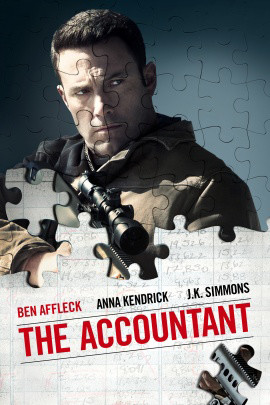As a medical student seeing autism spectrum disorder (ASD) patients in the clinic, I walked into The Accountant with baggage to say the least. This 2016 movie is Hollywood’s most recent take on ASD, and it has the dubious honor of being the first to feature an autistic assassin. Cinema is a potent force in our lives, capable of creating culture, as well as being informed by it, and I wondered what role The Accountant would play in shaping the ASD landscape.
My experience was as bifurcated as the movie itself. The Accountant is an ambivalent work. The obvious dichotomy resides in the protagonist Christian Wolff, a mathematically gifted strip mall CPA by day and assassin by night. The choice of Ben Affleck for this role is telling. In the same year as The Accountant, Affleck also reprised the role of Batman, arguably the prototypical divided superhero. The parallels are not subtle: Bruce Wayne/Batman is a template for an autistic accountant/assassin. There was a pleasure in seeing an ASD hero, someone able to leverage his disabilities and differences into strengths. However, it was a guilty pleasure because—while no doubt we need more ASD role models—it is questionable whether an assassin fits the bill.
The deeper dichotomy lies in what the movie tries to accomplish. On the one hand, it is an action thriller whose bottom line is to make money. It has a star-studded cast, slick action sequences, and a body count to rival Rambo. Yet it also seeks to be a social commentary, primarily through Wolff’s character and the loving attention splurged on developing it. In flashbacks we see him as a young boy who rocks repetitively, ritualistically sings a nursery rhyme, and panics when he loses a puzzle piece. We empathize with his dysfunctional family and the challenges of facing bullies.
The movie continues to build the adult Wolff’s character layer by layer, shining a light on some of the hallmark manifestations of ASD, such as strict adherence to routines and sensitivity to light and sounds. Wolff’s peculiarities are sketched by a friendly hand, and as spectator I never felt the need to laugh at Wolff, but only with him. He may be socially awkward and violent, but the takeaway feeling is being in the presence of an honorable man, one who is philanthropic (he gives most of his money to a neuroscience institute) and lives by a moral code.
Overall, The Accountant is a flawed film, not quite succeeding in striking the balance between entertainment and clinical reality. It often errs on the side of sensationalism, perpetuating the stereotype that the only thing redeeming in autism is “savantism.” It also does disservice to the ASD community by linking violence to it, especially against the backdrop of the Sandy Hook and Umpqua Community College shootings. However, while the movie falls short of its goal, I commend the effort and applaud it for its greatest strength: allowing the audience to connect with an antihero whose core disability is the inability to connect.

